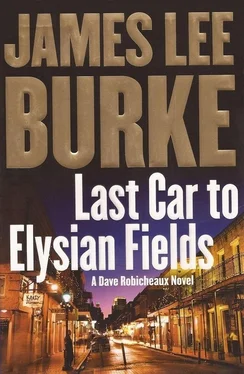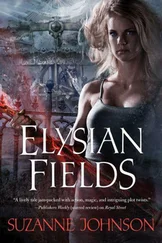“You don’t listen, Clete. It’s hopeless. You’ll never change.”
“Neither will you, Dave. You’d like to splatter every one of these shitheads, but you won’t admit it. Bootsie’s death is eating your lunch. You talk about getting honest at meets? Why don’t you stop stoking up your own fires?”
We drove over to Decatur in silence, wrapped in anger, with no destination, the sky as gray as dirty wash. Rainwater was spouting from the sewer grates, the guttural roar of the ruptured muffler vibrating through the Cadillac’s frame.
“If you want to attack me, Clete, do it. But don’t drag my wife’s death into it,” I said.
“I’m finished talking about it. Live your own life,” he replied.
At the traffic light in front of the Cafe du Monde I got out of the car, slammed the door behind me, and ran through the rain to the pavilion. When I looked back over my shoulder Clete was gone and Jackson Square looked as cold and stark as a black-and-white photograph taken in the dead of winter.
I ordered coffee and hot milk and a plate of beignets, but couldn’t eat. I walked the streets in the rain, keeping under the balconies, threading through the tourists carrying street-sale ten-dollar umbrellas. I looked through steam-coated windows of cafes and bars where people were watching Saturday-afternoon football on television.
On Dauphine I went into a bar that was packed with gay men, all of them shouting in unison to punctuate the gyrations of a famous transvestite dancing on the stage. The bartender wore a pencil-line mustache and earrings and a black leather cap and leather vest without a shirt. He stared at me across the bar.
“You have coffee?” I asked.
“This look like a Starbucks?” he replied in a New England accent.
“Give me a soda with a lime twist,” I said.
He fixed my drink and set it on the bar. He smiled to himself, but not offensively.
“On the job?” he said.
“No, not on the job,” I said.
“No problem, sir,” he said.
I closed my eyes as I drank down the soda and lime in the glass. I could have sworn I tasted the traces of bourbon in the ice. I used the rest room and walked back out on the street, my skin and clothes reeking of cigarette smoke, my head buzzing with sounds like an electric wire popping in a rain puddle.
I lost track of time. It stopped raining toward evening and a wet fog settled on the French Quarter and drifted like colored smoke off the neon lights over the clubs. Bourbon Street, which was closed at night to automobile traffic, became filled with college boys drinking beer out of plastic cups, conventioneers and tourists strung with cameras peering into strip joints that featured both topless and bottomless performances, and black kids tap dancing like minstrel caricatures or running a shuck that begins, “Bet you five dollars I can tell you where you got your shoes at.”
I walked along the river where bums sat on stone benches with sack-wrapped bottles of fortified wine between their thighs. I turned up Esplanade and walked all the way to the ragged edge of the Quarter at Rampart, past a hallelujah mission with a neon cross above its door, past Louis Armstrong Park, a place no white person in his right mind enters either day or night, over to Basin Street and the long-white wall that fronted St. Louis Cemetery. Through the gates I could see row upon row of whitewashed crypts and stone crosses, framed against the sodium lamps of the Iberville Project that burned in the fog with the incandescence of pistol flares.
I sat down on a bus bench next to a huge man with a wild beard and head of black hair. He wore a suit that looked like it had been pulled from a garbage can, a tie knotted like a garrote in the collar of his flannel shirt. His skin was so grimed with dirt it was hard to tell his race. His eyes made me think of the renegade Russian priest Rasputin.
“You got any money?” he said.
“What do you need it for?” I answered.
“Something to eat. Maybe a drink or two.”
I found four dollars and seventy-three cents in my pocket and gave it to him. He clenched it in his hand but remained seated on the bench.
“I got me a dry place in one of the tombs. The mission is all full on Saturday nights,” he said.
I nodded. A group of tourists were walking by, talking among themselves about either A Streetcar Named Desire , the play by Tennessee Williams, or the original streetcar itself, which today sits like an immobile and disconnected anachronism on a cement pad down by the river.
The disheveled man stood up and began waving his arms at them. “That streetcar didn’t go out to Desire,” he yelled. “It went out to Elysian Fields. It was the last car that still run out to Elysian Fields. All these streets here was Storyville. It was full of colored whorehouses and women who killed themselves with morphine. Hey, don’t you go in them crypts! The kids from the Iberville Project climb over the wall and bust people like you in the head. Are you listening to me? This ain’t New Orleans. You’re standing in the city of the dead. You just don’t know it yet.”
The tourists walked quickly up the street toward Canal, their faces ashen.
A minute later Clete Purcel’s Cadillac came around the corner, oil smoke leaking from under the frame, a hubcap rolling loose across the asphalt, like a paean to the disorder in his life. He pushed open the passenger door.
“Want to go back to New Iberia?” he said.
“Why not?” I said, and got inside. I looked through the back window at the silhouette of the disheveled man receding behind us.
“Sorry I got on your case. But I think Fat Sammy has been putting the slide on you,” Clete said.
“Maybe he has.”
“No maybe about it, Streak. Every ounce of meth going into the projects has Sammy’s greasy prints all over it. He makes me think of a giant snail trailing slime all over the city.”
“You’re one in a million, Cletus.”
He looked at me uncertainly, a pocket of air in one cheek, then roared up the ramp onto I-10. We poured it on all the way back to New Iberia, like two over-the-hill low riders who no longer look at calendars or watch the faces of clocks.
On Monday morning Mack Bertrand called me from the lab and said the shoes we had removed from Dr. Parks’s house were not the source of the leather scrapings found under the fingernails of the dead daiquiri vendor, Leon Hebert. A few minutes later Helen came into my office and I told her of the lab’s findings.
“So where does that leave us?” she said.
“A revenge killing of some kind. The daiquiri cup stuffed down the victim’s throat indicates a high level of rage. Dr. Parks had motivation.”
“You don’t sound convinced,” she said.
“Parks has so much anger I doubt he’d deny killing the man if he did it.”
“How about this guy Guillot?”
“He’s a poster child for obnoxiousness. But why would he shoot someone and throw the weapon, registered in his name, on the side of the road?”
“We’re talking about middle-class people, Streak. Career perps are predictable. Dagwood and Blondie aren’t.”
Beautiful.
But I believed there were other factors at work in this case that were more complex than a simple act of vengeance. It was too much for coincidence that Castille LeJeune’s corporation owned the daiquiri store where Leon Hebert had been murdered and that the murder weapon belonged to Will Guillot, one of his employees.
But Helen was right. We were dealing with middle-class people who didn’t have the proclivities and personal associations of career criminals, most of whom were basket cases who left a paper trail through the system from birth to the grave.
Why had Theodosha Flannigan been afraid to climb through the fence surrounding the fish pond on her father’s property? Why did Castille LeJeune say he had no memory of using his influence to get Junior Crudup off the levee gang at Angola? People denied evil deeds, not good ones.
Читать дальше












